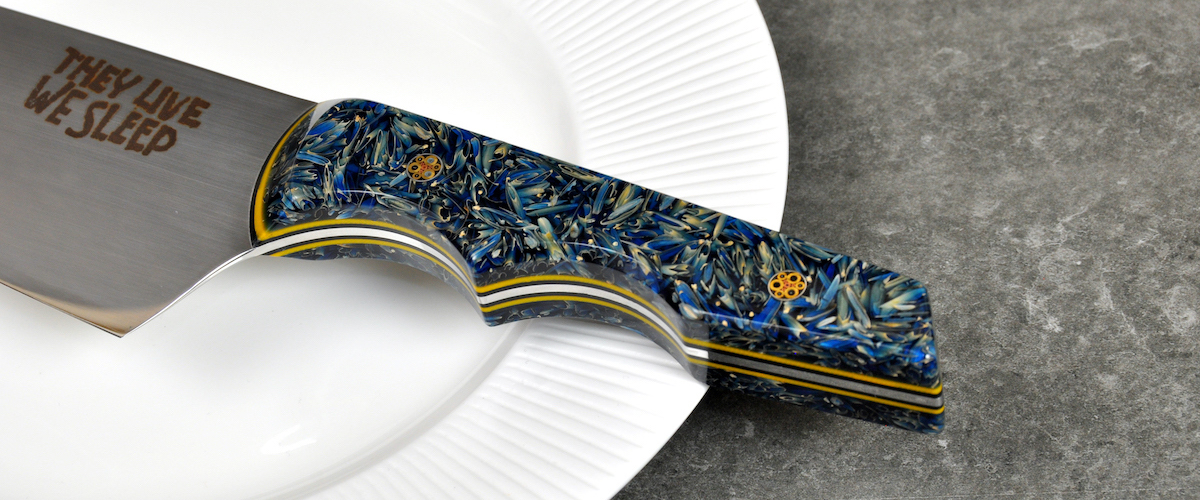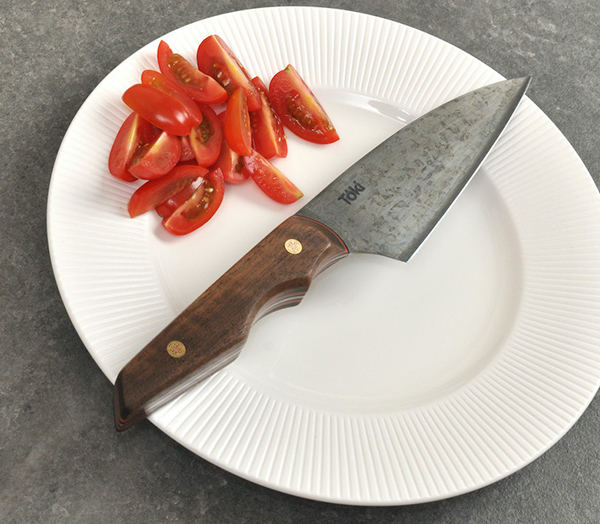
Care – Love your knife and your knife will love you
- NEVER put any knife in the dishwasher – the caustic detergent, heat, humidity and turbulence will blunten your knife, cause corrosion, and damage handles.
Instead gently wash and dry by hand using only gentle detergents. - Having a slightly damp tea towel next to your cutting board while preparing food to wipe your knife periodically is a good way to keep it clean during use, especially when dealing with acidic foods.
- Do not soak your knife in water – this could damage the handle or cause corrosion.
- Make sure to dry well after use and keep your knife in a dry place. Don’t leave your knife to dry on a drying rack where the edge could also be damaged by other objects. Instead dry with a tea towel and store in a knife rack.
- Use a wooden or plastic chopping board – never cut against a metal, ceramic, stone or glass surface (plates, glass chopping boards, etc.) these will instantly dull a knife edge.
- A honing steel will work but I don’t recommend it, they don’t tend to work well with particularly hard steel, rather you can use a strop to refine the edge from time to time between sharpening if you feel the need.
- Sharpen with whetstones – Everyone knows a blunt knife is a dangerous knife, so learn to keep yours sharp, there are plenty of resources online for learning how to sharpen on whetstones. I encourage you to learn to do it yourself so that you can stop your knives falling into disrepair.
- Sharpen often – The job will be quicker and you won’t have to remove as much material to bring back the edge.
- Over time a wooden handle may appear dry – To remedy this, you can use Danish Oil (Briwax is my brand of choice), follow the instructions on the tin. Alternatively a coat of butchers board oil or wax would also suffice.
Special notes for Carbon Steel:

- Carbon steel knives will rust if improperly cared for, drying after use and keeping them dry is important.
- If you live in a humid environment or are not going to use your carbon steel knives for a while, apply a thin coat of oil to the steel, buff the oil with a paper towel to remove the excess.
- If you do find yourself with a little rust on your blade, it can be cleaned up with a scotchbrite pad – This will also remove the patina but don’t panic, it will return naturally after some use or you can force the patina to return by adding a thin blotchy coating of mustard (yes – mustard, make sure the mustard you use contains vinegar) for 5 minutes or so. You will likely need to re-sharpen after forcing the patina.
Wooden Kitchen Utensils
Your utensils are coated in a custom beeswax and flaxseed oil blend which gives a food safe protective coating, to make this coating (and your utensil) last longer, follow the guidelines below:
- Don’t wash in the dishwasher, it only takes seconds to wash in warm soapy water by hand and will make any wood product last longer.
- Do not soak – Instead wash by hand, hand dry with a tea towel and let your utensil completely dry by air before putting away.
- To re-season your wooden spoon rub a light coating of any butchers block product or food grade mineral oil, Walnut, Coconut, Flaxseed or even canola oil onto your spoon or spatula with a paper towel, wipe off any excess and leave to dry before using or applying a second coat.
- With a good coating of oil/wax you should not have any issues but if your spoons do absorb any stain or odours, try cleaning with vinegar or baking soda. After cleaning let dry for at least 24 hours and then re-coat with oil as above.
